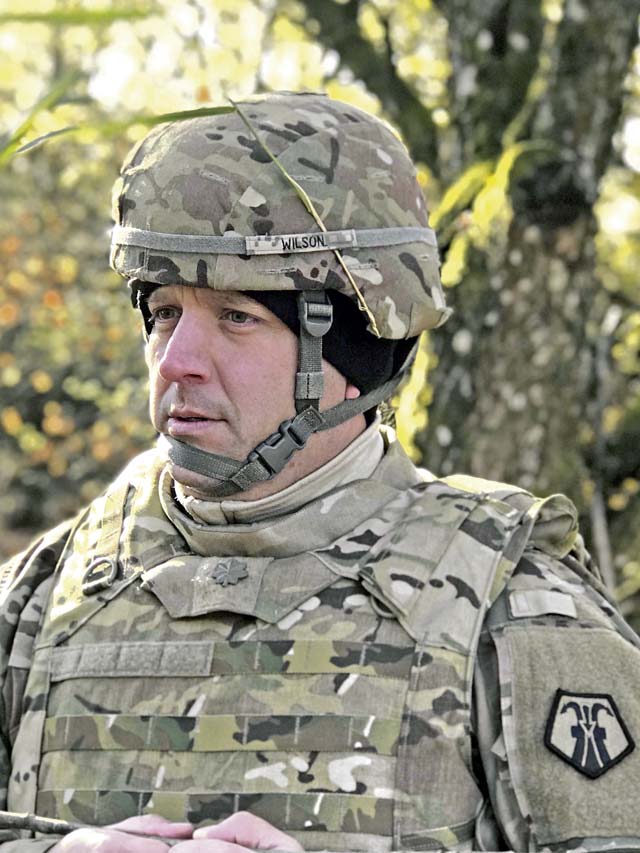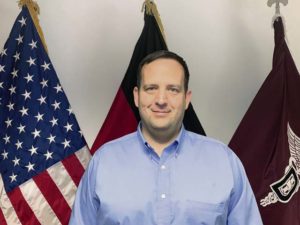
You never think a medical emergency is going to happen to you, but what if it does? And what if you are on a flight, two hours from your destination and over the Atlantic Ocean?

Hopefully, when the flight attendants ask for medical personnel on the flight to come forward, someone like Rob Wilson, Dental Health Command Europe Patient Safety Manager, is on board.
Wilson, who is also an operating room nurse in the Army Reserves, was recently on a flight from Frankfurt, Germany, to Orlando, Fla., when another passenger began having difficulty breathing. When medical personnel were asked to come to the back of the plane, he didn’t hesitate.
“We were over the ocean,” Wilson said, “when they asked for medical personnel. Without any hesitation I went back. I figured there would be a lot of other people and they probably wouldn’t even need me, but when I got back there it was myself and an American doctor.”
Wilson said the passenger who needed help was an older gentleman, who was pale, had clammy skin and was breathing shallow. After a quick assessment, Wilson determined the man’s Pulse oximetry — or oxygen level in the blood — was 60 percent and his heart rate was in the 80s.
Prior to Wilson and the doctor arriving, the flight attendants had already given the man an oxygen mask, however he wouldn’t keep it on. Wilson said with the oxygen mask his “oxygen readings would come up, but as soon as he took it off they would go back down.”
“He did not speak English, and his wife only spoke a little German,” Wilson said.
It turns out when the man was taking off his oxygen mask, he was asking his wife for his emergency inhaler.
“We finally figured out that he was asking his wife to get his emergency inhaler,” Wilson said. “But he wasn’t using it properly so the medication wasn’t getting to his lungs.”
Because the man’s vitals were not improving, Wilson and the doctor began getting ready to intubate, or place a flexible plastic tube into the trachea to maintain an open airway.
“I started getting everything together to do the intubation,” Wilson said, “and at the same time a German provider came back and spoke with the other doctor and they decided to give the man a steroid medication and valium to help calm him down, [rather than intubating].”
After about 30 minutes, the medications began working and the man was feeling well enough to go back to his seat for the rest of the flight.
Wilson’s work wasn’t done yet, he helped the flight attendants complete the paperwork to give the paramedics when the plane landed — that included annotating was what was given and when.
As a nurse in the Army Reserves, Wilson said his military training “definitely helped when it came to being able to work on the fly. Having been in the Reserves my whole Army career, we don’t typically have fixed facilities when we do our training, so I think that helped me stay calm and collected.”
Wilson added, “I think that’s my attitude in life too — get it done.”
That attitude has helped him progress since he joined the Army in 1993 as an operating room technician.
“I didn’t want to be in a medical field,” Wilson said. “I wanted to be an architect. I got into a school in Kansas City, but when they sent the bill, my parents said, ‘don’t look at us,’ so I joined the Army reserves to help pay for college.”
Because Wilson was looking to pay for college through his military service, he chose operating room technician for his military occupational specialty because they were getting some of the largest bonuses at the time. “So that is what I went with,” he said.
“Once I got into the field I loved it, and I never ended up going to school for architecture.”
Instead, he was sent active duty for 14 months to become a licensed practical nurse. He continued his education earning his associates degree and finally his bachelor’s degree. Once he had obtained his degree, he transitioned from the enlisted side and was commissioned as an operating room nurse in the Army Reserves.
Wilson said that one of the reasons he enjoys being a nurse is the “satisfaction of helping people and being part of something bigger than yourself.”
Currently, Wilson serves as the patient safety manager for all of the Army dental clinics in Europe. He said his focus is ensuring safe, quality care. That means “making sure we have the right patient, we are doing the right procedure, and on the right tooth,” he said.
Wilson hopes that in sharing his story he can encourage others to step up and help when needed.
“Do something. There is always something you can do. Even if it’s just holding the oxygen tank or reassuring the person. You don’t have to be an expert and do everything perfect, but do something.”


